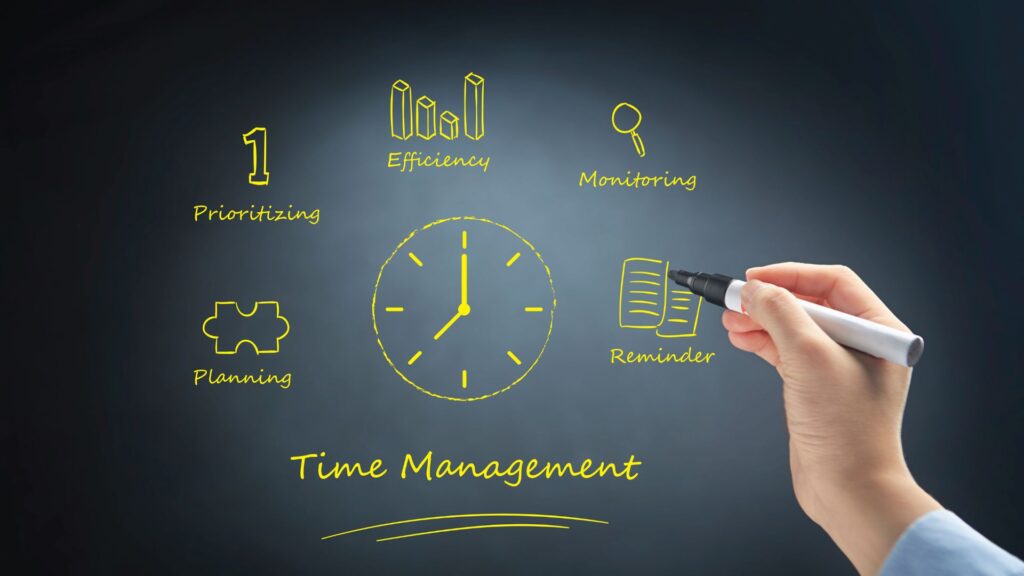
Effective Time Management – Managing your time well will help you get more done and feel less stressed in your home and professional life. It involves prioritizing tasks, setting clear goals, planning and scheduling, delegation, and the ability to say ‘no’ when necessary. Utilizing time management tools and overcoming common challenges can lead to increased profitability for businesses. Maintaining consistency and achieving work-life balance are essential for long-term success. By implementing these principles, you can take control of your time and enhance your overall productivity.
- The Fundamentals of Time Management
- Strategies for Efficient Time Management
- Tools and Resources for Time Management
- Time Management and Its Impact on Business Profit
- Overcoming Common Time Management Challenges
- Time Management in Daily Life
- FAQ’s
- What is the most crucial aspect of time management?
- How can I overcome procrastination and stay on track with my tasks?
- Can time management really boost business profitability?
- Are there any recommended time management tools for beginners?
- What’s the secret to achieving work-life balance through time management?
The Fundamentals of Time Management

Before we delve into the strategies, let’s start by defining what time management is and why it’s so crucial in both our personal and professional lives. Effective time management isn’t just about squeezing more tasks into your day; it’s about making the most of the time you have.
What is Time Management?
Scheduling and organizing how to spend your time on different tasks is what time management is all about. It’s about making choices about how to spend your time that are in line with your values and clear goals. Time management is not a one-size-fits-all approach. It’s about finding the methods and techniques that work best for you and your unique circumstances.
Assessing Your Current Time Management Skills
Before you can improve your time management, it’s essential to assess where you currently stand. Take a moment to reflect on your daily routine. Do you often find yourself rushing to meet deadlines, feeling overwhelmed by your to-do list, or struggling to balance work and personal life? These are common signs that your time management skills might need a tune-up.
Strategies for Efficient Time Management
Now that we’ve covered the basics, let’s move on to the heart of the matter: strategies for effective time management.
Prioritization Techniques
One of the cornerstones of time management is prioritization. Not all tasks are created equal. Some are more critical and time-sensitive than others. Learning to prioritize effectively can help you focus your energy where it matters most.
Effective prioritization involves:
- Identifying your most important tasks (MITs) for the day.
- Assigning deadlines to tasks.
- Considering both short-term and long-term goals when prioritizing.
Setting Clear Goals and Objectives
Goals give your work purpose and direction. Without them, you might find yourself drifting through your day, tackling tasks as they come without a clear sense of purpose. We’ll discuss how setting SMART (Specific, Measurable, Achievable, Relevant, Time-bound) goals can help you stay on track.
Setting clear goals involves:
- Defining what you want to achieve.
- Breaking larger goals into smaller, actionable steps.
- Reviewing your goals often and making changes as needed.
The Power of Planning and Scheduling
Planning and scheduling are like the compass and map of effective time management. We’ll explore how breaking your day into chunks and creating a schedule can lead to improved productivity.
Effective planning and scheduling include:
- Creating a daily or weekly schedule.
- Allocating specific time blocks for tasks.
- Allowing buffer time for unexpected issues or delays.
Delegation as a Time-Saving Tool
You don’t have to do it all alone. Delegation is a valuable skill that can free up your time and allow you to focus on your most critical tasks. We’ll provide tips on how to delegate effectively without micromanaging.
Effective delegation involves:
- Identifying tasks that can be delegated.
- Choosing the right person for the task.
- Communicating clear expectations and providing necessary resources.
The Art of Saying “No”
Sometimes, the most potent time management tool is the word “no.” Learning when and how to say no to additional commitments can help you protect your time and maintain your focus.
Saying “no” effectively includes:
- Evaluate your current workload before accepting new tasks.
- Politely declining requests while offering alternatives.
- Communicating your boundaries and priorities.
Tools and Resources for Time Management
In the digital age, we have access to a plethora of tools and resources that can aid our time management efforts. Let’s explore some of these options and how they can streamline your daily routine.

Introducing Time Management Apps and Software
There’s an app for almost everything, including time management. You will learn about some well-known time management applications and programs that can help you stay on track and prepared.
Some of these apps include:
- Todoist: A versatile task management app.
- Trello: A visual project management tool.
- Google Calendar: A user-friendly scheduling tool.
The Benefits of Using Productivity Tools
From to-do lists to project management platforms, productivity tools are designed to make your life easier. We’ll discuss the advantages of incorporating these tools into your daily routine.
Benefits of using productivity tools include:
- Streamlining task management.
- Enhancing collaboration with team members.
- Providing data and insights for better decision-making.
Tips for Choosing the Right Resources
Because there are so many choices, it’s important to pick the tools that fit your wants and preferences. We’ll provide tips on how to select the right time management resources for you.
When choosing time management resources, consider factors such as:
- Your preferred work style (digital or analog).
- Integration with other tools you use.
- Cost and scalability.
Time Management and Its Impact on Business Profit
Time management isn’t just about getting things done; it can also have a big effect on how much money a business makes. Let’s look at how making the most of your time can help your business make more money.
Boosting Profitability Through Time Management
We’ll explore real-life success stories of businesses that have implemented effective time management strategies and seen their profits soar. You’ll discover how improved efficiency can translate into a healthier bottom line.
For businesses, time management can result in:
- Faster project completion and delivery.
- Improved customer satisfaction.
- Increased capacity to take on new opportunities.
Overcoming Common Time Management Challenges
No journey is without its obstacles, and time management is no exception. We’ll address some of the most common challenges people face when trying to manage their time effectively and provide practical solutions.
Addressing Procrastination
Procrastination can be a significant roadblock to effective time management. We’ll offer strategies for overcoming procrastination and getting tasks done.
To overcome procrastination:
- Identify the root causes of procrastination.
- Break tasks into smaller, manageable steps.
- Use time-blocking techniques to stay on track.
Dealing with Distractions
In today’s digital age, distractions are everywhere. We’ll discuss how to minimize distractions and create a focused work environment.
To minimize distractions:
- Create a dedicated workspace.
- Turn off non-essential notifications.
- Use productivity apps to block distracting websites.
Maintaining Consistency in Time Management Practices
Consistency is key to long-term success in time management. We’ll share tips on how to maintain and reinforce your time management habits.
To maintain consistency:
- Set reminders and alarms for important tasks.
- Establish daily routines that support your goals.
- Review and make changes to your time management tactics on a regular basis.
Time Management in Daily Life
To wrap up our journey towards effective time management, we’ll explore how these principles apply to your daily life, both at work and at home.
Time Management at Work
We’ll provide practical advice on how to implement time management strategies in your professional life, from managing meetings to handling email overload.
Effective time management at work includes:
- Prioritizing tasks based on importance and deadlines.
- Using time tracking tools to monitor your productivity.
- Setting boundaries to protect your work time.
Balancing Personal and Professional Responsibilities
Achieving work-life balance is a common goal for many individuals. We’ll discuss how effective time management can help you strike that balance and enjoy a fulfilling personal life.
Balancing personal and professional responsibilities requires:
- Allocating time for self-care and relaxation.
- Communicating your boundaries to family and friends.
Cultivating Healthy Habits
Finally, we’ll emphasize the importance of maintaining healthy habits that support your overall well-being and productivity.

Cultivating healthy habits includes:
- Getting enough sleep to stay refreshed and alert.
- Getting enough nutrients in your food will help your body and mind.
- Incorporating regular physical activity into your routine.
Time management skills that work well can make a big difference in your personal and business life. Putting the tips and tactics talked about in this detailed article into action can help you get more done, feel less stressed, and be more productive overall. BusinessProfit can help you get started on the path to being more efficient right away.
FAQ’s
What is the most crucial aspect of time management?
Prioritization is the cornerstone of effective time management. Identifying and focusing on your most important tasks (MITs) ensures that you allocate your time where it matters most.
How can I overcome procrastination and stay on track with my tasks?
To overcome procrastination, break tasks into smaller, manageable steps, set deadlines for each step, and use time-blocking techniques to create dedicated work periods.
Can time management really boost business profitability?
Yes, effective time management can significantly impact business profitability. It leads to faster project completion, improved customer satisfaction, and increased capacity to take on new opportunities.
Are there any recommended time management tools for beginners?
For beginners, popular time management tools include Todoist for task management, Trello for project organization, and Google Calendar for scheduling.
What’s the secret to achieving work-life balance through time management?
Achieving work-life balance involves setting boundaries, allocating time for self-care, and maintaining healthy habits. Consistent time management practices help you balance professional and personal responsibilities effectively.

1 comment on “Effective Time Management: Achieve More”